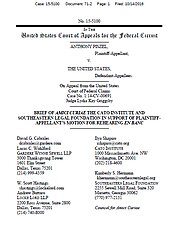Piszel v. United States
Learn more about Cato’s Amicus Briefs Program.
The Takings Clause of the Fifth Amendment is clear and concise: “nor shall private property be taken for public use, without just compensation.” Indeed, for the Framers of our Constitution, the protection of private property was the “guardian of every other right.” For the better part of a century, however, federal courts have relied on ad hoc determinations of what constitutes a taking under the Fifth Amendment. Sadly, in Piszel v. United States, the Federal Circuit Court of Appeals has once again muddied the waters and failed to protect basic property rights. Usually, when people think of a taking or of “eminent domain,” they think of the government taking land in order to build roads, parks, or other infrastructure. But other types of property can be taken by the government and thus require “just compensation” under the Fifth Amendment. If the government interferes with a valid contract, for example, it must pay just compensation just as if it had taken a person’s land. In this case, Anthony Piszel was the one-time CFO of Freddie Mac, a private lending organization sponsored by the government to provide stability in the housing market. Mr. Piszel was hired by the organization in 2006, and as part of his compensation package he was to receive stocks in the organization, incentive-based bonuses, and—in the event of termination—a lump-sum payment. In 2008, when the housing market collapsed, Congress responded by passing the Housing and Economic Recovery Act of 2008 (HERA). HERA established the Federal Housing Finance Agency (FHFA), which was given the power to take over as the conservator of Freddie Mac should it come into financial trouble. In addition, FHFA would be able to disaffirm or repudiate any contract Freddie Mac had entered into. While HERA allowed for compensatory damages for these contract breaches, it also included a “golden parachute” exception, which allowed FHFA to deny any compensation that was statutorily defined as a “golden parachute” for a departing executive. Shortly after the HERA was passed, FHFA took over as conservator for Freddie Mac and then ordered Freddie Mac to cancel Piszel’s contract. In the letter instructing Freddie Mac to terminate Piszel, FHFA requested that he be fired “without cause” and that he should not receive any of his contractual benefits because the compensation fell into the golden parachute exception. Piszel filed suit against the United States claiming that his contractually guaranteed property had been taken in violation of the Fifth Amendment. The Court of Federal Claims held that, because he had no property interest in his contractual rights, he was barred from bringing a constitutional takings claim unless he first brought a breach of contract claim against Freddie Mac. On appeal before a three-judge panel, the Federal Circuit correctly disagreed, holding that contractual property rights are protected under the Fifth Amendment and that bringing a separate suit for breach of contract is not a prerequisite to bringing a takings claim. The panel went further, however, and held that, because the government had not taken away his right to sue for breach of contract, it had not taken away his property. Piszel has now asked for en banc review from the Federal Circuit, which is when all the judges on the court are asked to review a three-judge panel’s decision. In an amicus brief supporting that petition, Cato, joined by the Southeastern Legal Foundation, argue that the panel’s decision allows for an unwarranted and unwise expansion of government power. Never before has regulatory authority ordered the taking of private contract rights without cause and without compensation. The panel’s opinion allows the government to escape all liability for ordering the termination of a private contract by shifting the compensatory burden to another private entity. This cannot and should not be the law. The Fifth Amendment’s requirement to pay “just compensation” for a taking is a burden on government, not on private entities.
